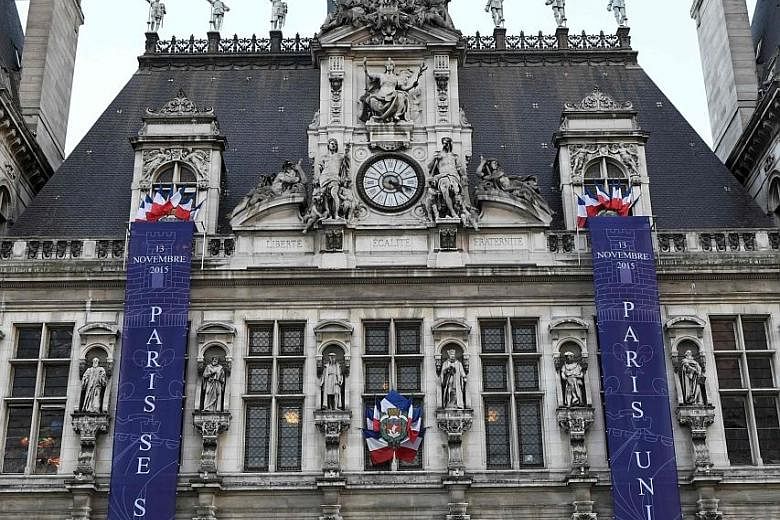PARIS • A year after militants sowed terror in Paris, killing 130 people, the City of Light is struggling to restore its lustre as fearful tourists stay away in droves.
In the Paris area alone, tourism revenue is expected to plunge by €1.5 billion (S$2.3 billion) this year.
"We haven't recovered," said Paris region's tourism chief, Mr Frederic Valletoux. "The impact is lasting and completely unprecedented."
France's Socialist government on Monday unveiled a €42 million plan to boost security in tourist areas, on top of €10 million already earmarked for promotional efforts.
"Tourism in France is going through a difficult period," said Prime Minister Manuel Valls.
The new measures will tighten security at prime tourist magnets such as the Louvre - the world's most-visited museum - which saw a 20 per cent drop in visitors in the past year.
Tourist arrivals to France were down 8.1 per cent in the 10 months from January to October. The government has set a goal of attracting 100 million foreign visitors in 2020, compared with 85 million last year.
Officials had hoped the stay-away trend would reverse after the successful hosting of the Euro football championship in July. But just days after the end of the tournament, the tourism sector took a massive new blow with the Bastille Day truck rampage in the Riviera resort city of Nice that claimed a further 86 lives.
"People are afraid because it's not just one thing but a series" of attacks in France, said Serbian tourist Vladimir Mitrasinovic, a London- based tech executive who was visiting Paris for a reunion with his former colleagues.
Restaurants "are getting hit hard, both in Paris and the Riviera", said Mr Roland Heguy, head of the hotel industry association UMIH. The summer months, normally the peak tourist season, "were very bad for this sector", he said.
The terror attacks were significant, but not alone, in discouraging tourism over the past year, which has also seen massive street protests over labour reforms that frequently turned violent.
Among other deterrents, the Paris region has seen a series of thefts targeting Asian visitors.
"Asian tourists - all tourists - must know that they are safe in France," Mr Valls' office said.
January to October saw a 39 per cent fall in Japanese tourists and 23 per cent fewer Chinese visitors.
On a recent afternoon, shoppers entering the venerable Printemps department store gamely submitted to metal detector wands. Ms Liu Yan, one of the store's dozens of Chinese sales assistants, said the wands were introduced about a year ago - corresponding to the November attacks.
"I'm afraid it doesn't look like (shopping tourism) is coming back," said Ms Liu, 37, who has worked at Printemps for four years.
She added that the rash of robberies targeting Chinese was one factor keeping Asian tourists away. "But the sense that France isn't safe is especially because of the attacks."
In the Pigalle district, home to the Moulin Rouge, Danish tourist Jens Peter Frahm-Hansen said the attacks by Islamic militants did not deter him. "You shouldn't be afraid of these types of people. That's what they want," the 64-year-old retired Kodak executive said.
His friend, Mr Mitrasinovic, was equally sanguine about the threat. "Most of us think it won't stop, so we won't change our plans."
AGENCE FRANCE-PRESSE

